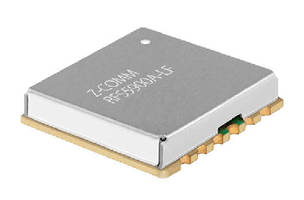
Fixed Frequency Synthesizer features integrated reference.
Housed in PLL-V12N package measuring 0.6 x 0.6 x 0.16 in., Model RFS5900A-LF operates at 5,900 MHz which is phase locked to 10 MHz reference with stability of Ã-
Read More »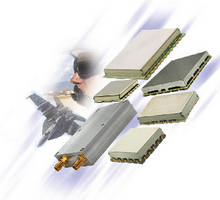
Frequency Synthesizer supports GSM applications.
Measuring 0.910 x 0.910 x 0.252 in., Model RSN-1618AF-119+ is packaged in metal case to shield against unwanted signals and noise. Unit operates from 1,543-1,618 MHz and features max settling time of 35 Ã-µsec. With components secured to substrate using chip adhesive in addition to solder, surface mount synthesizer can be used as local oscillator in up-conversion and down-conversion sections...
Read More »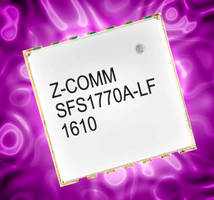
Fixed Frequency Synthesizer features low phase noise.
Operating at 1,770 MHz, Model SFS1770A-LF features typical phase noise of -95 dBc/Hz at 10 kHz offset and typical sideband spurs of -70 dBc. Unit delivers output power of 6 dBm with VCO supply of 5 Vdc while drawing 35 mA, and phase locked loop voltage of 3 Vdc while drawing 9 mA over temperature range of -40 to 85Ã-
Read More »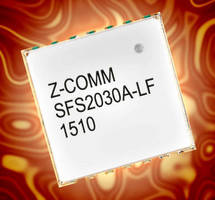
Fixed Frequency Synthesizer operates at 2,030 MHz.
Suited for fixed wireless and microwave radio applications, Model SFS2030A-LF features typical phase noise of -95 dBc/Hz at 10 kHz offset and typical sideband spurs of -70 dBc. Unit delivers output power of 6 dBm with VCO supply of 5 Vdc while drawing 35 mA, and phase locked loop voltage of 3 Vdc while drawing 9 mA over temperature range of -40 to 85Ã-
Read More »
Design Guide: Heat Sinks for High-Power Applications
Without appropriate thermal management, electronic components will degrade over time, causing problems ranging from minor errors to critical failures.
Read More »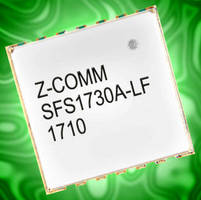
L-Band Fixed Frequency Synthesizer features low phase noise.
Operating at 1,730 MHz, SFS1730A-LF features typical phase noise of -95 dBc/Hz @ 10 kHz offset and typical sideband spurs of -70 dBc. RoHS-compliant product delivers typical output power of 6 dBm with VCO voltage supply of 5 Vdc while drawing 35 mA (typ) and phase locked loop (PLL) voltage of 3 Vdc while drawing 9 mA (typ) over -40 to +85Ã-
Read More »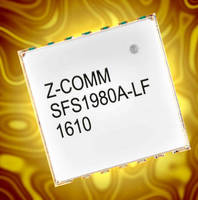
Fixed Frequency Synthesizer operates in L-band.
Operating at 1,980 MHz, Model SFS1980A-LF features typical phase noise of -95 dBc/Hz at 10 kHz offset and typical sideband spurs of -70 dBc. Unit delivers output power of 6 dBm with VCO voltage supply of 5 Vdc while drawing 35 mA, and phase locked loop voltage of 3 Vdc while drawing 10 mA over temperature range of -40 to 85Ã-
Read More »Fixed Frequency Synthesizer features low phase noise.
Operating in L-band at 1,720 MHz, SFS1720A-LF features typical phase noise of -96 dBc/Hz @ 10 kHz offset and typical sideband spurs of -70 dBc. RoHS-compliant single frequency synthesizer delivers typical output power of 6 dBm with VCO voltage supply of 5 Vdc while drawing 35 mA (typ) and PLL voltage of 3 Vdc while drawing 9 mA (typ) over -40 to +85Ã-
Read More »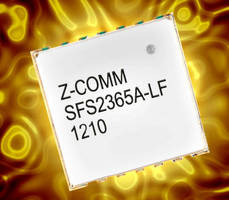
Fixed Frequency Synthesizer features low phase noise.
Operating at 2,365 MHz, Model SFS2365A-LF features typical phase noise of -95 dBc/Hz at 10 KHz offset and typical sideband spurs of -70 dBc. Unit delivers typical output power of 6 dBm with VCO voltage supply of 5 Vdc while drawing 40 mA and phased locked loop voltage of 3 Vdc while drawing 9 mA over temperature range of -40 to 85Ã-
Read More »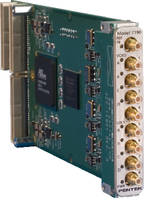
Multifrequency Clock Synthesizer optimizes signal quality.
Using 4 TI CDC7005 clock synchronizers, each controlling one quad-frequency VCXO, Model 7190 lends designers working with A/Ds and D/As precise source of clock signals in PMC format. All 8 output clocks are phase-locked to external frequency reference, and unit is programmed to select any one of its 4 VCXO frequencies. Resulting frequencies can be divided by 1, 2, 4, 8, or 16. Up to 5 different...
Read More »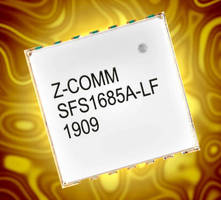
Fixed Frequency Synthesizer operates at 1,685 MHz.
Measuring 0.60 x 0.60 x 0.13 in., Model SFS1685A-LF features typical phase noise of -106 dBc/Hz at 10 kHz offset and typical sideband spurs of -80 dBc. Unit delivers output power of 6 dBm with VCO voltage supply of 5 Vdc while drawing 31 mA and phased locked loop voltage of 3 Vdc while drawing 9 mA over temperature range of -40 to 85Ã-
Read More »
Micro Air's Dust, Fume, Mist Collection Equipment Facilitate a Safe Work Environment
Dust, fume, and mist collectors from Micro Air promote a safer, more productive work environment. Our wide array of products are available to the industrial manufacturing sector for processes such as welding, cutting, grinding, blasting, and more. Check out our video to learn more.
Read More »



